Bernie Sanders on Asian American & Pacific Islander Rights
Bernie Sanders recognizes the many ways in which Asian Americans and Pacific Islanders (AAPIs) are discriminated against. For decades he has spoken out against the economic exploitation of migrant workers – including victims of trafficking – and he has supported legislation to end these practices. Bernie also recognizes the cultural, linguistic and bureaucratic obstacles preventing AAPIs from accessing basic social services. These obstacles plague every aspect of our society – from immigration to education to healthcare. Accordingly, Bernie believes that we need to improve access to social services and opportunities for AAPIs, and he has consistently supported legislation to do so.
Racism & Exploitation: Bernie wants to reform the structural policies that reinforce racism and exploitation against AAPIs.
Economic Inequality: Decades of unjust and ineffective economic policies that favor those in power have resulted in historic levels of income and wealth inequality. This especially impacts minorities and immigrants.
Education: Bernie is a supporter of a more accessible and comprehensive education system. He believes this will create a more competitive workforce and informed society.
Immigration: Bernie supports reform that will bring unauthorized Americans out of the shadows. To unite families, Bernie wants to create a clear pathway to citizenship for both those who were raised here and parents of citizens.
Health & Human Services: Many AAPIs have cultural and linguistic factors that may introduce challenges when accessing human services. Bernie works toward providing better access to these services that every American deserves.
Racism & Exploitation
Racism and exploitation against Asian Americans and Pacific Islanders must end, and the structures that support racial inequality must be reformed.
Many of the stereotypes and disadvantages AAPIs face are reinforced by corporate policies, international deals on trade and visas, and a broken immigration system.
Huh? How are AAPI stereotypes related to those policies?
Racism is a complex subject in general, and much of racism against AAPIs is covert. Most Americans are led to believe that AAPIs are doing well, but we remain unaware of the challenges that exist within many nationalities and locations. This creates a “model minority” myth that silences legitimate needs and encourages racism through stereotypes.
What’s more, corporate loopholes and laissez-faire international trade agreements often exacerbate these issues. As Bernie has pointed out, «Immigrants and racial and ethnic minorities in many parts of the world not only have been subjected to exploitation, but also have been abused as scapegoats for the economic troubles caused by corporate globalization.» This dynamic of racist stereotypes having broader social and economic implications is wonderfully explained by this video:
Wow, that’s a lot to take in. What are some specific examples of this exploitation?
One of the main ways that this happens is by abusing worker visas, as explained in Economic Policy Institute’s well-sourced article, On Immigration, Bernie Sanders is Correct:
Many employers have used guestworker programs to avoid hiring U.S. workers, or have replaced their existing workforce with guestworkers after first forcing U.S. workers to train their guestworker replacements as a condition of their severance packages. Employers substitute guestworkers for Americans because guestworkers can be legally paid tens of thousands of dollars less than similarly skilled U.S. workers. Young foreign workers in the country on J-1 “cultural exchange” visas have been mistreated and forced to live in filthy basements while being paid $1 an hour, and even coerced into “sex slavery.” The exploitation inherent in all of these guestworker programs is a feature of them, not a bug.
While these workers are from a variety of countries, a significant number of those who receive nonimmigrant visas are from Asian and Pacific regions.
How does Bernie want to fix this?
Bernie wants to stop businesses from exploiting international workers, but he doesn’t want to end guestworker programs when used appropriately. To this end, he cosponsored the H-1B and L-1 Visa Fraud and Abuse Prevention Act of 2007, which would increase increase protections for workers, close loopholes allowing companies to skirt regulations, and impose harsher penalties for violations of the law. This would reward companies who are following the law by cracking down on those that don’t.
Also, in 2010, Bernie introduced the Increasing American Wages and Benefits Act which, among other provisions, would prevent companies from hiring recruiters who travel to foreign countries to seek, coerce, and commit fraud against potential workers.
What about more explicit forms of exploitation?
Sadly, labor and sex trafficking are still very common in our society, both domestically and abroad. In the U.S., the vast majority of victims of trafficking are immigrants. Internationally, American tourists are among the worst offenders when it comes to “sex tourism”, particularly in South Asian countries.
Bernie has supported many anti-trafficking bills, including co-sponsoring the sweeping Victims of Trafficking & Violence Protection Act of 2000. This legislation established the Office to Monitor and Combat Trafficking in Persons which issues yearly reports detailing human trafficking investigations and offers T visas to any international or undocumented victims and their families.
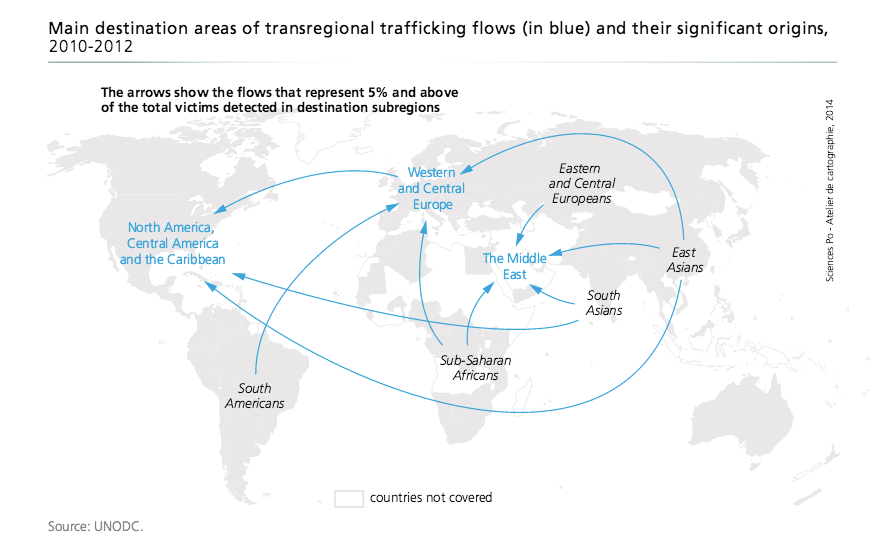
Do our international trade agreements have anything to do with trafficking?
Unfortunately, yes – particularly labor trafficking. For decades, Bernie has warned that our pro-corporate free trade policies feed into human rights abuses in the labor supply chain, and he has taken steps to eliminate U.S. involvement in every instance.
See, for example, Bernie calling out Treasury Secretary Robert Rubin back in 1998. At issue was the Secretary’s decision to uphold a loan to Indonesian President Suharto, a corrupt billionaire dictator infamous for systemic workers’ rights violations and other forms of human rights abuse:
Following this hearing, Bernie worked with Rep. Barney Frank (D-MA) in drafting an amendment to Title 22 of the United States Code which outlines the U.S. government’s positions on foreign relations. The amendment, titled §262p–4p: Encouragement of fair labor practices, requires the Treasury Secretary to screen all potential borrowers for workers’ rights abuses and to submit an annual report to Congress detailing the human rights records of all borrowing countries.
What has Bernie done more recently to end U.S. involvement in worker exploitation?
Overall, Bernie has co-sponsored at least 15 labor trafficking bills, all of which died in committee. One of the most notable pieces of legislation was the Decent Working Conditions and Fair Competition Act of 2007. A Senate Hearing took place directly before this bill died, in which Bernie said:
In my view, if, to the degree that the people of our country know what is happening in countries like China, where people are being exploited so ruthlessly, where their lives are endangered by horrendous working conditions and exposure to harmful chemicals, to the degree that the American people understand that – and they are understanding it more and more – they will say, ‘‘No more. We need to rethink these entire policies.”
Lastly, Bernie has been strongly against the Trans-Pacific Partnership (TPP), urging President Obama in a letter to cancel his meeting with Nike, a company whose multi-billionaire leaders regularly exploit workers in undeveloped countries. The TPP also continues the shameful tradition of American economic policy turning a blind eye to human trafficking around the world.
Bernie acknowledges the importance of international trade and pushes for fair regulations that benefit all, but he has consistently opposed free trade deals like the TPP which ship American jobs overseas to countries with no respect for workers’ rights. See our Trade issue page for more information.
Economic Inequality
Bernie thinks that an economic system is broken when it caters to the greed of the super-rich while leaving middle and working class people behind. Our growing inequality has many causes, but of particular importance are an inefficient tax code that favor the extremely wealthy, repeated financial bailouts to large banks at taxpayers expense, and an electoral system that allows billions to be spent on lobbying and political campaigns. Bernie wants to reform each of these to curtail the overwhelming influence of wealthy interests in our society, and to overall rebalance our economy so that hard-working Americans have a fair chance at not just earning a living, but pursuing their dreams.
So how do AAPIs fit into this?
Although overall AAPIs tend to have higher rates of education and income, the practical reality of economic inequality is much more nuanced and complex. There are about 20 million individuals of the very diverse AAPI population group, and many subpopulations have disproportionately high rates of unemployment and poverty. For example, poverty rates are abnormally high in cities most populated by particular nationalities. 20% of Chinese Americans in New York City live in poverty. 17% of Korean Americans in Los Angeles are below the poverty line, and the same goes for 28% of Pacific Islanders in urban Honolulu. In specific boroughs of New York City – which has the largest AAPI population in the country – child poverty rates are 60% among Bangladeshi Americans, and nearly 50% among Vietnamese Americans.
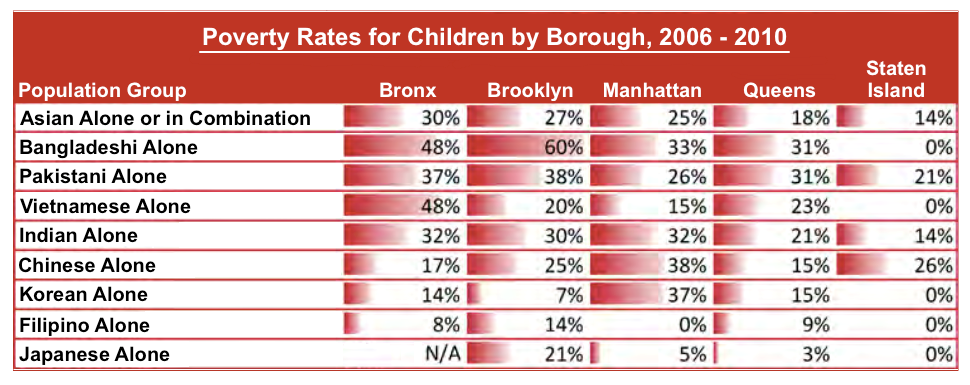
There are several factors that make moving up the socioeconomic ladder difficult for many AAPIs. For one, 12% of the unauthorized (or undocumented) population in the U.S. are Asian Americans (see Immigration, below). Long-term unemployment is also a concern, especially with rising levels of student loan debt. Studies show that AAPI college graduates have higher unemployment rates than similarly educated whites. Of unemployed Asian Americans, nearly 50% were jobless for more than six months in 2010.
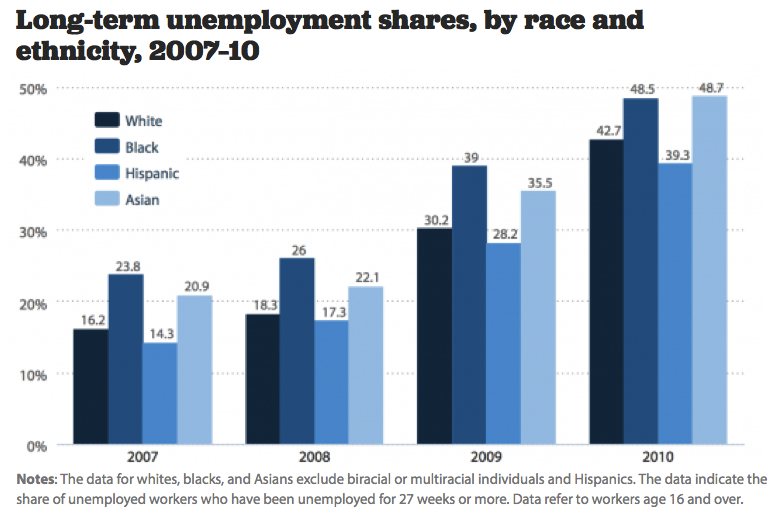
So how is Bernie fighting to get AAPIs fair access to equal employment?
Bernie has always valued the strength of worker diversity, working on measures like promoting minority-owned businesses in 1998. In addition to recently proposing legislation to create 13 million new jobs by rebuilding our crumbling infrastructure, Bernie is a cosponsor of the Equal Employment for All Act of 2015 which would prohibit employers from running credit checks on interviewees. This would allow more opportunities for AAPIs whose credit suffered due to unemployment. Bernie is also a strong supporter of unions that benefit AAPIs on many levels, including better hourly wages, health insurance, and plans for retirement:
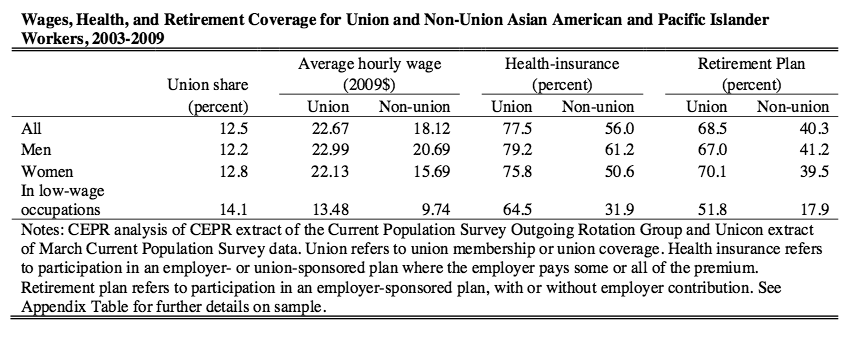
Education
We need to provide a more accessible and comprehensive education system. This will create a more competitive workforce and raise the American standard of living.
I bet the “model minority” myth affects AAPIs in school as much as in the workplace, huh?
Yep, good call. As described in the Racism & Exploitation section, many AAPIs are restricted by high expectations when it comes to education due to the “model minority” myth. AAPIs are aware that this stereotype can limit their educational opportunities when it comes to financing and applying to college and exploring new fields. Bernie is strongly in favor of education reform to make school more accessible and affordable to a wider spectrum of students, and he supports affirmative action policies that increase diversity on college campuses.
Before recently introducing legislation to eliminate tuition at public colleges, Bernie voted for the Higher Education Opportunity Act of 2008 that now funds minority programs and research at colleges and universities (explicitly including AAPI), with funding priority given to institutions that enroll at least 10% AAPI undergraduate students. In terms of helping unauthorized students with education, Bernie was a cosponsor of the DREAM Act of 2009 of which the President’s Advisory Committee on AAPI supported, stating:
According to a University of California report, Asian and Pacific Islander students make up approximately 40 percent of the total undocumented student population enrolled in the University of California system. Additionally, many undocumented Asian students are children of parents who have fled from war-torn countries.(source)
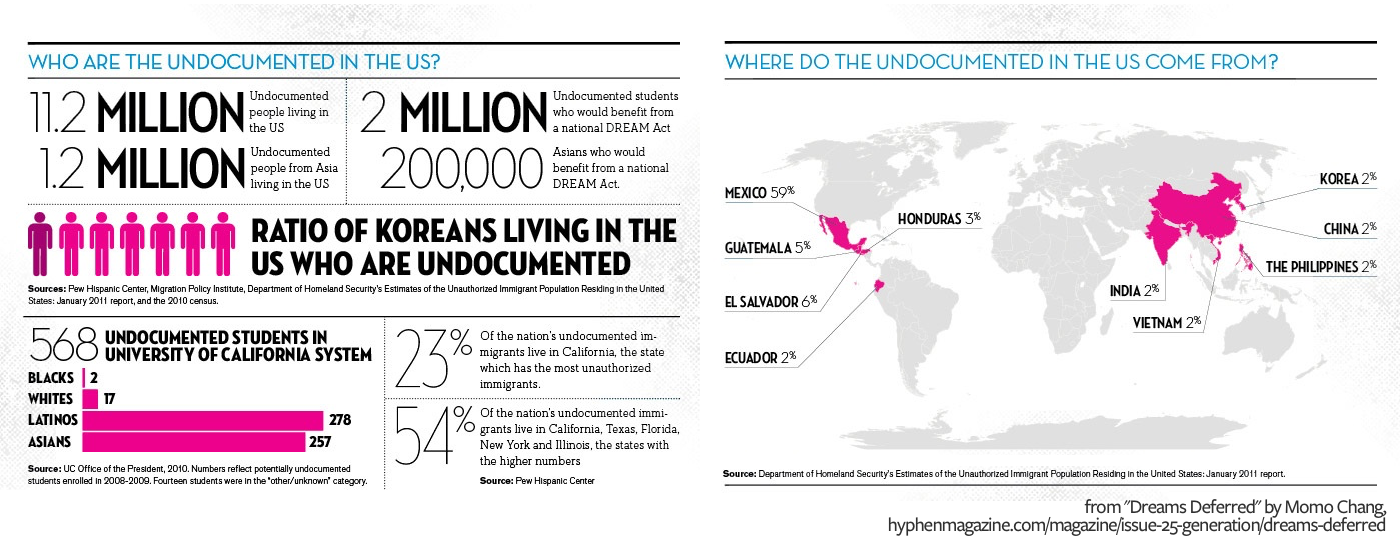
Pretty impressive. Does Bernie want to help AAPI students before college too?
Yes! Bernie supports strengthening our elementary and high school education programs. For example, the Secondary School Reentry Act of 2011 (and the similar DIPLOMA Act of 2014) focused on financing programs to help more students graduate, even pointing out that the 2008 Asian American unemployment rate of 57% was disproportionately higher than other ethnicities for those who have not completed high school. In addition to placing value on an educated society, Bernie emphasizes that a more educated workforce will bolster our economy:
The Alliance for Excellent Education reports that dropouts from the class of 2010 alone will result in more than $337,000,000,000 in lost wages over the course of such individuals’ lifetimes. (source)
Immigration
We need to reform our immigration policy to bring unauthorized Americans out of oppression and create a clear pathway to citizenship.
Wait, I thought immigration was mostly a Latino issue?
Actually, even though Asian American and Pacific Islanders are a smaller group than Hispanic Americans as a whole, there have been a larger number of Asian immigrants in recent years:
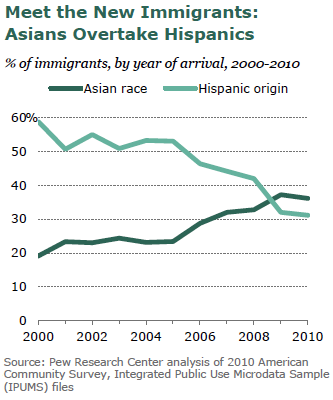
Unfortunately, out of the approximately 20 million AAPIs, an estimated 1.2 million were unauthorized (undocumented) in 2010. Despite misconceptions, many arrive legally and become trapped in our broken immigration system:
“We entered using the tourist visa, with the intention of adjusting our status. But the opportunity just never came. None of my parents’ employers could sponsor their work permits which would have set them on the path to a green card. I was angry with my mum for not being able to provide for me what my US citizen friends had,» Choi added. «It was only when I was in college that I realized it’s not entirely her fault, and that the system’s so broken it’s forced us to become undocumented.”
What types of opportunities would be limited if I was an unauthorized AAPI?
Being unauthorized restricts AAPIs’ abilities to attend college, travel, or even drive. What’s more, employers often threaten to report individuals with an unauthorized status if they don’t comply with poor working conditions and low wages (e.g., restaurateurs and nail salon owners), leading to further alienation from society. This also has a negative impact on our economy by limiting our potential for an educated workforce and pressuring other businesses to cut corners and lower prices to remain competitive. In fact, in the 2013 National Asian American Survey, 58% support a path to citizenship and 54% indicate that visa backlogs is a significant problem for their families:
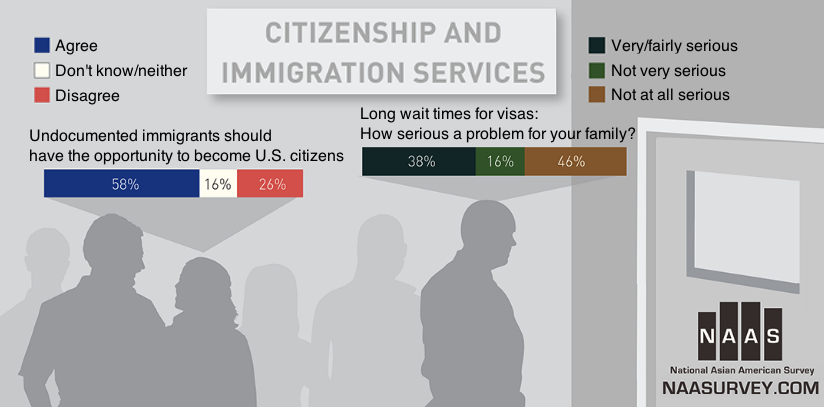
Wow, that does seem like a pretty pervasive problem. So how has Bernie helped AAPI immigration, specifically?
Immigration proposals are often intertwined with other topics such as education, but there has been a few critical immigration issues that are specific to those of Asian descent – particularly those intertwined with military conflicts. When Bernie was a first-term Representative of Vermont, the House voted in favor of the Chinese Student Protection Act of 1992 which gave Chinese Nationals who were here during the Tiananmen Square massacre the opportunity to apply for permanent residency. In 2004, Bernie cosponsored legislation to grant U.S. citizenship to people born in Korea, Vietnam, Laos, Kampuchea, or Thailand between 1950 and 1982 who also had permanent residency and were fathered by a United States citizen.
Hold on, I thought Bernie wants to cut down on the number of visas? Isn’t that hurting AAPI legal immigration?
Not quite. Those policies are centered around non-immigration visas and aim to guard both American and international workers against unethical employer practices. Bernie is a protectionist — not just for Americans, but for all vulnerable groups (see Racism & Worker Exploitation). In fact, Bernie has been active in addressing international relief needs as far back as high school: he ran for class president on a platform to raise scholarship money for Korean orphans who lost their parents during the Korean War. He lost that election but his idea was implemented anyway.
Okay, but our immigration system is still pretty messed up. How does Bernie plan to fix it moving forward?
Bernie has many concrete plans to reform immigration and improve existing immigration programs. For example, President Obama’s Deferred Action for Childhood Arrivals (DACA) program is a good first step as 55% of the youth applied out of 1.2 million who immediately met criteria. Within that however, only 21% have applied out of the 71,000 Asian youth, so we still have a lot of work to do. Bernie also wants to add to DACA the parents of citizens, parents of legal permanent residents, and the parents of DREAMERs, too. This will unite families and help create better living situations.
Health & Human Services
We need to offer quality health and human services that are accessible to all.
Of course, we deserve that as Americans! But why might AAPIs need various ways to access these services?
Many cultural, linguistic, socioeconomic, and even immigration barriers may arise and introduce challenges when many AAPI individuals require human services. These challenges may prevent them from getting financial, occupational, healthcare, or legal help, and often this significantly impact their lives in vital ways. Bernie works toward providing better and more diverse access for AAPIs and others who may be more cautious or wary in seeking assistance.
One big challenge to navigating available services is communication – people should be able to access and understand government services that are offered to them. 35% of Vietnamese-American, 31% of Korean-American, and 29% of Chinese-American households are linguistically isolated, where members of the households who are older than 13 speak English “less than very well”. Bernie voted against legislation that would have declared English as the official U.S. language in 2007, we have no official language specifically because of our immigrant heritage. Additionally, Bernie has always supported more accessible processes in voter registration and balloting procedures, and he voted in support of the National Voter Registration Act of 1993 that was enacted to allow voter registration with DMV paperwork and added voter protections.
This is also true for many AAPIs in the financial arena, particularly those who have immigrated or are moderate to low income. Knowing about finances is key to achieving economic security, but knowing where to receive the best help and who to trust is often tricky due to language barriers or even deception in other countries that causes immigrants to be wary about services here:
When examining whom AAPIs turn to for financial advice or information, the data indicates that there is a significant gap in the availability of language and culturally-appropriate services and information, and that promotion of existing services may not reach the intended audiences. Fifty six percent (56%) of respondents indicated they don’t know where to turn for advice (25%) or turn to potentially unreliable sources for information, such as the internet (7%) and family and friends (24%). Community-based resources, such as those offered at local non-profits were underutilized.
Yeah, we do need to work on that. What about access to healthcare?
Similarly, linguistic barriers and not knowing where to get trustworthy information can also pose challenges in accessing healthcare for AAPIs. As a group overall, AAPIs are less likely to receive preventative care. For example, adult Asian-American women were least likely to have had a Pap test to get screened for cancer:
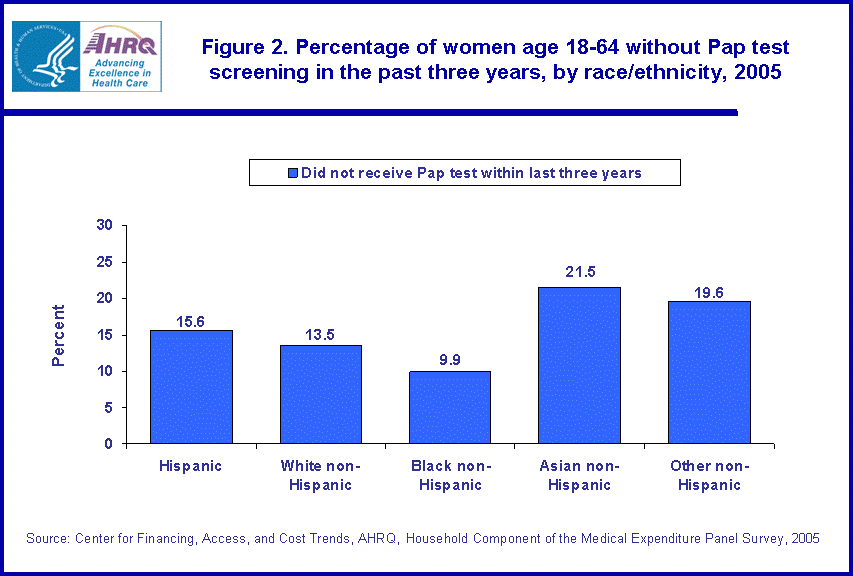
Bernie has introduced and cosponsored several bills to reform health care that require culturally and linguistically appropriate measures to increase access. For example, one 2013 bill required the selection of “Health Security Standards Board members “shall represent the various geographic regions of the United States and shall reflect the racial, ethnic, and gender composition of the population of the United States.” (p. 63) This would ensure that our diverse population is represented when determining appropriate care. Also, as part of the expansion of the Affordable Care Act that Bernie helped push, the Asian American Health Coalition of Greater Houston received $650,000 in 2015.
Stresses and challenges in life can affect mental health. However, AAPIs often face cultural stigma when considering mental health treatment despite the fact that many have faced extreme challenges like immigrating from war-torn countries:
As a largely immigrant and refugee population, Asian Americans face economic and language barriers that prevent them from accessing health care and make them more vulnerable to advanced depression and other mental health disorders. Stress related to immigration and acculturation may also be a factor in developing depression.
With the added “model minority” stereotype, Asian American females between 15 to 24 years old have the highest completed suicide rates across all racial/ethnic groups, and 71% of Southeast Asians meet the criteria for a major affective disorder (including depression). In 2013, Bernie cosponsored legislation to help address this by financing linguistically-appropriate community-based programs mental health systems in schools to bring about positive behavioral interventions.
There are very similar barriers with health insurance as well: compared to 12% non-elderly white population, almost 18% of Asian Americans and 24% of Native Hawaiians are uninsured. For many years, Bernie has strongly advocated for a single-payer healthcare system that would provide health insurance to all Americans as a right. See more of Bernie’s plans for healthcare reform.